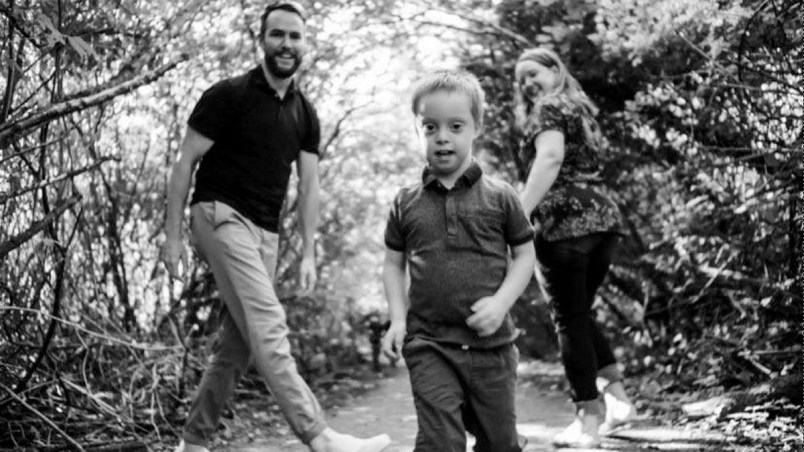Many parents are struggling to work from home while serving as homeschool teachers to their kids during the COVID-19 pandemic, but disability advocates and parents of children with special needs say the challenges are even greater for that vulnerable population.
Lyra McLean’s son Torin has Down syndrome, and she says not having a predictable classroom schedule or one-on-one support from an educational assistant has been hard on the energetic five-year-old.
“He really thrives when he has predictability in his day,” said the Saanich mom. “It’s created a lot more anxiety and stress and it’s created behavioural challenges for him.”
Torin’s regular in-person visits with occupational and speech therapists through Queen Alexandra Centre for Children’s Health have switched to video chats, which have proven challenging, she said.
“His interest and his ability to be focused on a computer is so limited,” McLean said.
Ellen Tarshis, executive director of Community Living Victoria, said family-support workers have been hearing from parents of children with disabilities about the difficulties of online learning.
For example, a child with epilepsy cannot handle more than 10 minutes of screen time a day because it triggers seizures, Tarshis said. Another child is so fixated on the screen, they have a meltdown any time the computer is taken away.
In another scenario, a youth with autism struggles with change and is confused as to why his mom is helping him with his school work. “He consistently refuses to do schooling and says: ‘You’re not my teacher,’ ” Tarshis said.
The non-profit agency has also heard from parents with mental-health challenges who are facing the added pressure of homeschooling, Tarshis said.
“Parents are working from home and trying to homeschool a child with a disability — they’re just not managing both, so often the school work does not get completed,” she said. “Overall, with our families, the children with very high needs who require one-to-one support are really struggling with the online schooling.”
In some cases, parents might need to put aside the school curriculum and find everyday learning opportunities for their children, she said. That could include building something, planting a garden or going for a hike and incorporating math or science.
Not all children with high needs are having difficulties, however. Tarshis said some can focus better at home without the distraction of classmates.
“Some of these children, they struggle socially, they have a tough time making friends or figuring out how to fit in and school can add to that anxiety,” Tarshis said.
Family-support workers have also been delivering groceries and helping out with errands, she said, especially for families that are reluctant to go out because their children have higher health risks.
McLean has the option of sending Torin back to his preschool at Maria Montessori Academy part-time in June, but since he’s immune-compromised due to asthma, she doesn’t want to take the risk.
Torin wouldn’t be able to follow the physical-distancing guidelines at school, McLean said. “As much as it would be nice for him to go back to school I wouldn’t want him to possibly be exposed [to the virus],” she said.
McLean has four children between the ages of two and 11, and the family made the decision together not to send her two older sons, Kingston and Lochlan, to school this summer.
The family gets in-home help from a nanny while McLean operates the Momease Baby Boutique retail store and her husband works from home at his banking job.
McLean has been able to access funding through the Queen Alexandra Centre for Children’s Health that will allow an educational assistant to come to their home to support Torin, who loves to bounce on the backyard trampoline, put on oven mitts to cook at his play kitchen and dance to Baby Shark.
“He really does need that stimulation and that one-on-one work.”
The Ministry of Education says children who require additional in-class support have been able to remain in school full-time and that will continue into June, when phase 3 of the province’s restart plan will allow kindergarten to Grade 12 students to return to school part-time.
The ministry said over the past two months, parents have been able to access the website Keep Learning with free resources that complement the B.C. curriculum and support remote learning for students.
“In April, inclusive education specialist Shelley Moore partnered with the ministry on a twice-a-week video series to support children with diverse abilities,” the ministry said in a statement. “Ministry staff have also been meeting weekly with inclusive education organizations (Inclusion B.C., B.C. ED Access and Family Support Institute) to discuss challenges families are facing and develop solutions.”
Read more from the Times Colonist


